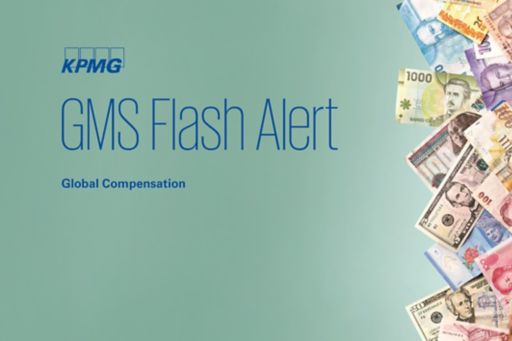Singapore – Treatment of Employee Benefits Given via Cash Reimbursements
Singapore – Treatment of Employee Benefits Given via Ca
The Central Provident Fund (CPF) Board in Singapore recently provided an update to the treatment of cash reimbursements made under employee/flexible benefits schemes which will take effect from 1 January 2020. Consequently, reimbursements for dental treatment for an employee’s spouse and child will no longer attract CPF contributions while reimbursements to an employee for holiday-related expenses will attract CPF, regardless of whether such reimbursement is attributable to the employee or his/her immediate family member.

SUBSCRIBE
To subscribe to GMS Flash Alert, fill out the subscription form.
The Central Provident Fund (CPF) Board in Singapore recently provided an update to the treatment of cash reimbursements made under employee/flexible benefits schemes which will take effect from 1 January 2020.1 Consequently, reimbursements for dental treatment for an employee’s spouse and child will no longer attract CPF contributions while reimbursements to an employee for holiday-related expenses will attract CPF, regardless of whether such reimbursement is attributable to the employee or his/her immediate family member.
WHY THIS MATTERS
Flexible benefit schemes are commonly used by employers to allow employees to claim reimbursement for a variety of staff benefits. However, operating such schemes may create additional complexity in respect of Central Provident Fund contributions.
This update brings greater clarity around certain forms of cash reimbursements and the application of CPF contributions.
Background
In general, CPF contributions are payable on wages which are paid to employees as reward for services rendered. Section 2(1) of the CPF Act defines wages as remuneration in money, including any bonus, due or granted to a person in respect of this employment. Wages include payments for employee’s expenses which are not necessarily incurred on behalf of the employer (i.e., reimbursement of personal expenses). In contrast, cash reimbursements to employees for expenses incurred necessarily on behalf of the employer (i.e., business expenses) are not regarded as wages for CPF purposes, provided that the reimbursement does not exceed actual expenditure.
Summary: Treatment of Employee Benefits via Cash Reimbursement
Effective 1 January 2020, the CPF treatment of employee benefits via cash reimbursement is summarized below.
| Cash Re-imubrsements | Subject to CPF? | ||
|---|---|---|---|
| Employee | Employee's spouse | Employee's child | |
| Medical treatment2, 3 | No | No | No |
| Dental treatment2, 3 | No | No1 | No1 |
| Holiday benefits | Yes1 | Yes | Yes |
| Other benefits4 | Yes | Yes | Yes |
1 Applicable with effect from 1 January 2020.
2 Expenses incurred locally or overseas (including medical tests such as blood tests, x-ray, etc.) must be deemed necessary by a registered doctor, dentist, or Traditional Chinese Medicine (“TCM”) practitioner.
3 Expenses incurred on health screenings or medical examinations that are not part of medical treatment by a registered doctor, dentist, or TCM practitioner (i.e., employees go for the health screening or medical examination on their own accord), will attract CPF contributions.
4 CPF contributions are payable on reimbursement of personal expenses (e.g., medical insurance, gym memberships, vision care, child care, elderly care fees, etc.)
KPMG NOTE
This update is a welcome change as it provides greater clarity on the overall CPF treatment of select cash reimbursements under flexible benefit schemes and provides further consistency on the CPF treatment for reimbursement of personal expenses. This is expected to ease the administrative burden on employers when undertaking CPF reporting.
RELATED ARTICLE
This article is excerpted, with permission, from “Update to Central Provident Fund (‘CPF’) treatment of employee benefits given via cash reimbursements – Effective 1 January 2020,” in Tax Alert (Issue 09, November 2019), a publication of the KPMG International member firm in Singapore.
FOOTNOTE
1 See this webpage of the Central Provident Fund Board.
The information contained in this newsletter was submitted by the KPMG International member firm in Singapore.
GMS Flash Alert is a Global Mobility Services publication of the KPMG LLP Washington National Tax practice. The KPMG name and logo are trademarks used under license by the independent member firms of the KPMG global organization. KPMG International Limited is a private English company limited by guarantee and does not provide services to clients. No member firm has any authority to obligate or bind KPMG International or any other member firm vis-à-vis third parties, nor does KPMG International have any such authority to obligate or bind any member firm. The information contained herein is of a general nature and is not intended to address the circumstances of any particular individual or entity. Although we endeavor to provide accurate and timely information, there can be no guarantee that such information is accurate as of the date it is received or that it will continue to be accurate in the future. No one should act on such information without appropriate professional advice after a thorough examination of the particular situation.
